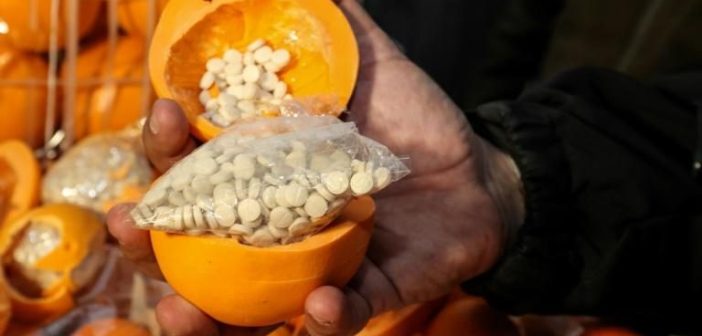
by Elizabeth Hagedorn @ElizHagedorn – almonitor.com –– WASHINGTON — The Biden administration on Tuesday unveiled new sanctions aimed at curbing Syria’s production and export of Captagon, an illegal amphetamine that serves as a key source of revenue for the Syrian regime. The sanctions are the administration’s first to target Syria’s Captagon trade and also its first use of so-called Caesar Act, a law that allows for sanctions on persons or companies that do business with the Syrian government. In a statement, Secretary of State Antony Blinken vowed the United States would continue targeting Syria’s drug traffickers and “those who provide support to the Syrian regime’s vicious war.”
An estimated 80% of the world’s Captagon supply is produced in Syria, where the stimulant has become the war-ridden country’s main export. The UK government, which unveiled its own sanctions in coordination with the US, described the Captagon trade as a “financial lifeline” for Assad’s regime worth $57 billion. Among those designated by the US Treasury Department’s Office of Foreign Assets Control was Khalid Qaddour, a Syrian businessman who is a close associate of Maher al-Assad, a brother of Syrian President Bashar al-Assad who heads the Fourth Division of the Syrian Arab Army. According to OFAC, Qaddour is responsible for managing the Fourth Division’s revenues from facilitating the production and trafficking of Captagon. Also designated was Samer Kamal al-Assad, a cousin of the Syrian president who allegedly oversees Captagon facilities in the regime-controlled port city of Latakia in coordination with the Fourth Division and certain associates of the Lebanese militant group Hezbollah. Assad reportedly owns a Captagon production factory in the Qalamoun region near the Syria-Lebanon border.
The Treasury Department blacklisted Wassim Badi al-Assad, another of Assad’s cousins who it accused of helping smuggle contraband, Captagon and other drugs throughout the region with the Syrian regime’s tacit support. Imad Abu Zureik, a militia leader linked to drug production and smuggling in southern Syria, was also designated. OFAC Director Andrea Gacki described Syria as a global leader in the production of Captagon, much of which is moved through Lebanon. “With our allies, we will hold accountable those who support Bashar al-Assad’s regime with illicit drug revenue and other financial means that enable the regime’s continued repression of the Syrian people,” Gacki said in a statement. The sanctions also took aim at Lebanese drug traffickers for their role in Syria’s Captagon trade. OFAC also designated Hassan Muhammad Daqqou, a Lebanese-Syrian dual national dubbed the “King of Captagon” by the media. In 2021, Daqqou was arrested on drug trafficking charges tied to a shipment of Captagon intercepted in Malaysia on its way to Saudi Arabia.
The Treasury additionally designated known Lebanese arms dealer Noah Zaitar and two companies registered under Daqqou’s name in Lebanon’s Beka’a Valley region. Two of the targets announced Tuesday — Qaddour and Samer Kamal al-Assad — were designated under the Caesar Act along with other sanctions authorities. Named for the defector who smuggled evidence of torture and murder out of Syrian regime prisons, the bipartisan Caesar Act was designed to choke off the Syrian government’s financial lifelines and prevent reconstruction in government-held parts of the country. The sanctions come less than a week after leading Republicans and Democrats expressed frustration that Biden hasn’t once used the bipartisan Caesar Act to apply economic pressure on the regime’s benefactors.
In a letter to Secretary of State Blinken and Treasury Secretary Janet Yellen, House Foreign Affairs Committee Chairman Michael McCaul (R-Texas), ranking member Gregory Meeks (D-N.Y.), Senate Foreign Relations Committee Chairman Bob Menendez (D-N.J.) and ranking member Jim Risch (R-Idaho) noted the “disappointingly slow pace of sanctions under the Caesar Act,” which they described as “powerful tool to curb efforts to rehabilitate or normalize relations with the Assad regime.” Included in the annual defense policy bill signed by President Joe Biden in December 2022 was the Captagon Act, which requires the administration to develop an interagency strategy to “deny, degrade, and dismantle Assad-linked narcotics production and trafficking networks.” Blinken told a House hearing last week that the administration is developing its strategy and will submit a report to Congress. Read more: https://www.al-monitor.com/originals/2023/03/new-us-sanctions-target-syrias-captagon-trade-linked-assad#ixzz7xHNHqGz0



